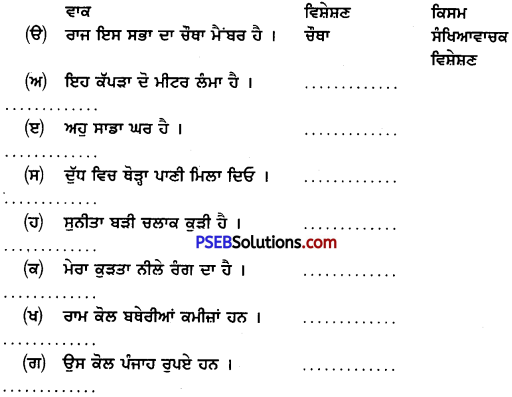Punjab State Board PSEB 8th Class Punjabi Book Solutions Punjabi Grammar Bahute Shabda di Than ek-Sabada ਬਹੁਤੇ ਸ਼ਬਦਾਂ ਦੀ ਥਾਂ ਇਕ-ਸ਼ਬਦ Textbook Exercise Questions and Answers.
PSEB 8th Class Punjabi Grammar ਬਹੁਤੇ ਸ਼ਬਦਾਂ ਦੀ ਥਾਂ ਇਕ-ਸ਼ਬਦ
1. ਉਹ ਥਾਂ ਜਿੱਥੇ ਪਹਿਲਵਾਨ ਘੋਲ ਕਰਦੇ ਹਨ – ਅਖਾੜਾ
2. ਉਹ ਪਾਠ ਜੋ ਅਰੰਭ ਤੋਂ ਲੈ ਕੇ ਅੰਤ ਤੱਕ ਅਰੁੱਕ ਕੀਤਾ ਜਾਵੇ – ਅਖੰਡ-ਪਾਠ
3. ਉਹ ਥਾਂ ਜੋ ਸਭ ਦੀ ਸਾਂਝੀ ਹੋਵੇ – ਸ਼ਾਮਲਾਟ
4. ਉਹ ਪੁਸਤਕ ਜਿਸ ਵਿਚ ਲਿਖਾਰੀ ਨੇ ਕਿਸੇ ਹੋਰ ਵਿਅਕਤੀ ਦੀ ਜੀਵਨੀ ਲਿਖੀ – ਹੋਵੇ
5. ਉਹ ਪੁਸਤਕ ਜਿਸ ਵਿਚ ਲਿਖਾਰੀ ਵਲੋਂ ਆਪਣੀ ਜੀਵਨੀ ਲਿਖੀ ਹੋਵੇ – ਸ਼ੈਜੀਵਨੀ
6. ਉਹ ਮੁੰਡਾ ਜਾਂ ਕੁੜੀ ਜਿਸ ਦਾ ਵਿਆਹ ਨਾ ਹੋਇਆ ਹੋਵੇ – ਕੁਆਰਾ/ਕੁਆਰੀ
7. ਉਹ ਵਿਅਕਤੀ ਜੋ ਹੱਥ ਨਾਲ ਮੂਰਤਾਂ (ਤਸਵੀਰਾਂ) ਬਣਾਵੇ – ਚਿਤਰਕਾਰ
8. ਉਹ ਅਖ਼ਬਾਰ ਜੋ ਹਫ਼ਤੇ ਬਾਅਦ ਨਿਕਲੇ – ਸਪਤਾਹਿਕ
9. ਉਹ ਥਾਂ ਜਿੱਥੋਂ ਚਾਰੇ ਪਾਸਿਆਂ ਵਲ ਰਸਤੇ ਨਿਕਲਦੇ ਹੋਣ – ਚੁਰਸਤਾ
![]()
10. ਉਹ ਧਰਤੀ ਜਿੱਥੇ ਦੂਰ ਤਕ ਰੇਤ ਹੀ ਰੇਤ ਹੋਵੇ – ਮਾਰੂਥਲ
11. ਉੱਚੇ ਤੇ ਸੁੱਚੇ ਆਚਰਨ ਵਾਲਾ – ਸਦਾਚਾਰੀ
12. ਆਗਿਆ ਦਾ ਪਾਲਣ ਕਰਨ ਵਾਲਾ – ਆਗਿਆਕਾਰੀ
13. ਉਹ ਥਾਂ ਜਿੱਥੇ ਘੋੜੇ ਬੱਝਦੇ ਹੋਣ – ਤਬੇਲਾ
14. ਉਹ ਧਰਤੀ ਜਿਸ ਵਿਚ ਕੋਈ ਫ਼ਸਲ ਨਾ ਉਗਾਈ ਜਾ ਸਕਦੀ ਹੋਵੇ – ਬੰਜਰ
15. ਆਪਣਾ ਉੱਲੂ ਸਿੱਧਾ ਕਰਨ ਵਾਲਾ – ਸਵਾਰਥੀ
16. ਆਪਣੀ ਮਰਜ਼ੀ ਕਰਨ ਵਾਲਾ – ਆਪਹੁਦਰਾ
17. ਸਾਹਿਤ ਦੀ ਰਚਨਾ ਕਰਨ ਵਾਲਾ – ਸਾਹਿਤਕਾਰ
18. ਕਹਾਣੀਆਂ ਲਿਖਣ ਵਾਲਾ – ਕਹਾਣੀਕਾਰ
19. ਕਵਿਤਾ ਲਿਖਣ ਵਾਲਾ – ਕਵੀ/ਕਵਿਤਰੀ
20. ਚਰਖਾ ਕੱਤਣ ਵਾਲੀਆਂ ਕੁੜੀਆਂ ਦਾ ਇਕੱਠ – ਛਿੰਝਣ
21. ਚਾਰ ਪੈਰਾਂ ਵਾਲਾ ਜਾਨਵਰ – ਚੁਪਾਇਆ
22. ਸੋਨੇ ਚਾਂਦੀ ਦੇ ਗਹਿਣਿਆਂ ਦਾ ਵਪਾਰ ਕਰਨ ਵਾਲਾ – ਸਰਾਫ਼
23. ਕੰਮ ਤੋਂ ਜੀਅ ਚੁਰਾਉਣ ਵਾਲਾ – ਕੰਮ-ਚੋਰ
24. ਜਿਹੜਾ ਪਰਮਾਤਮਾ ਨੂੰ ਮੰਨੇ – ਆਸਤਕ
25. ਜਿਹੜਾ ਪਰਮਾਤਮਾ ਨੂੰ ਨਾ ਮੰਨੇ – ਨਾਸਤਕ
26. ਜਿਹੜਾ ਕਿਸੇ ਦੀ ਕੀਤੀ ਨੇਕੀ ਨਾ ਜਾਣੇ – ਅਕ੍ਰਿਤਘਣ
27. ਜਿਹੜਾ ਬੋਲ ਨਾ ਸਕਦਾ ਹੋਵੇ – ਗੂੰਗਾ
![]()
28. ਜਿਹੜਾ ਸਾਰੀਆਂ ਸ਼ਕਤੀਆਂ ਦਾ ਮਾਲਕ ਹੋਵੇ – ਸਰਬ-ਸ਼ਕਤੀਮਾਨ
29. ਜਿਹੜਾ ਕੋਈ ਵੀ ਕੰਮ ਨਾ ਕਰੇ – ਵਿਹਲੜ,ਨਿਕੰਮਾ
30. ਜਿਹੜਾ ਕਦੇ ਨਾ ਥੱਕੇ – पाटव
31. ਜਿਹੜਾ ਕਦੇ ਨਾ ਟੁੱਟੇ – ਅਟੁੱਟ
32. ਜਿਹੜਾ ਕਿਸੇ ਚੀਜ਼ ਦੀ ਖੋਜ ਕਰੇ – ਖੋਜੀ
33. ਜਿਹੜਾ ਕੁੱਝ ਵੱਡਿਆਂ ਵਡੇਰਿਆਂ ਕੋਲੋਂ ਮਿਲੇ – ਵਿਰਸਾ
34. ਜਿਹੜਾ ਮਨੁੱਖ ਪੜਿਆ ਨਾ ਹੋਵੇ – ਅਨਪੜ੍ਹ
35. ਜਿਹੜਾ ਦੇਸ਼ ਨਾਲ ਗ਼ਦਾਰੀ ਕਰੇ – ਦੇਸ਼-ਧੋਹੀ/ਗੱਦਾਰ
36. ਜਿਹੜਾ ਬਹੁਤੀਆਂ ਗੱਲਾਂ ਕਰਦਾ ਹੋਵੇ – ਗਾਲੜੀ
37. ਜਿਹੜੇ ਗੁਣ ਜਾਂ ਔਗੁਣ ਜਨਮ ਤੋਂ ਹੋਣ – ਜਮਾਂਦਰੂ
38. ਜਿਹੜਾ ਬੱਚਾ ਘਰ ਵਿਚ ਸਭ ਬੱਚਿਆਂ ਤੋਂ ਪਹਿਲਾਂ ਪੈਦਾ ਹੋਇਆ ਹੋਵੇ – ਜੇਠਾ
39. ਜਿਹੜਾ ਮਨੁੱਖ ਕਿਸੇ ਨਾਲ ਪੱਖਪਾਤ ਨਾ ਕਰੇ – ਨਿਰਪੱਖ
40. ਜਿਹੜੇ ਮਨੁੱਖ ਇਕੋ ਸਮੇਂ ਹੋਏ ਹੋਣ – ਸਮਕਾਲੀ
41. ਜਿਸ ਨੇ ਧਰਮ ਜਾਂ ਦੇਸ਼ – ਕੌਮ ਲਈ ਜਾਨ ਕੁਰਬਾਨ ਕੀਤੀ ਹੋਵੇ – ਸ਼ਹੀਦ
42. ਜਿਸ ਨੂੰ ਸਾਰੇ ਪਿਆਰ ਕਰਨ – ਹਰਮਨ-ਪਿਆਰਾ
43. ਜਿਸ ਨੂੰ ਕਿਹਾ ਜਾਂ ਬਿਆਨ ਨਾ ਕੀਤਾ ਜਾ ਸਕਦਾ ਹੋਵੇ – ਅਕਹਿ
44. ਜਿਸ ਉੱਤੇ ਕਹੀ ਹੋਈ ਕਿਸੇ ਗੱਲ ਦਾ ਉੱਕਾ ਅਸਰ ਨਾ ਹੋਵੇ – ਢੀਠ
![]()
45. ਜਦੋਂ ਮੀਂਹ ਨਾ ਪਵੇ ਜਾਂ ਮੀਂਹ ਦੀ ਘਾਟ ਹੋਵੇ – ਔੜ
46. ਜਿਸ ਸ਼ਬਦ ਦੇ ਅਰਥ ਹੋਣ – ਸਾਰਥਕ
47. ਜਿਸ ਸ਼ਬਦ ਦੇ ਕੋਈ ਅਰਥ ਨਾ ਨਿਕਲਦੇ ਹੋਣ – ਨਿਰਾਰਥਕ
48. ਜੋ ਦੁਸਰਿਆਂ ਦਾ ਭਲਾ ਕਰੇ – ਪਰਉਪਕਾਰੀ
49. ਜੋ ਬੇਮਤਲਬ ਖ਼ਰਚ ਕਰੇ – ਖ਼ਰਚੀਲਾ
50. ਜੋ ਆਪ ਨਾਲ ਬੀਤੀ ਹੋਵੇ – ਹੱਡ-ਬੀਤੀ
51. ਜੋ ਦੁਨੀਆਂ ਨਾਲ ਬੀਤੀ ਹੋਵੇ – ਜੱਗ-ਬੀਤੀ
52. ਪਿੰਡ ਦੇ ਝਗੜਿਆਂ ਦਾ ਫ਼ੈਸਲਾ ਕਰਨ ਵਾਲੀ ਸਭਾ – ਪੰਚਾਇਤ
53. ਜਿੱਥੇ ਰੁਪਏ ਪੈਸੇ ਜਾਂ ਸਿੱਕੇ ਬਣਾਏ ਜਾਣ – ਟਕਸਾਲ
54. ਹੋ ਸਹਿਣ ਨਾ ਕੀਤਾ ਜਾ ਸਕਦਾ ਹੋਵੇ – ਅਸਹਿ
55. ਜੋ ਪੈਸੇ ਕੋਲ ਹੁੰਦਿਆਂ ਹੋਇਆਂ ਵੀ ਜ਼ਰੂਰੀ ਖ਼ਰਚ ਨਾ ਕਰੇ – ਕੰਜੂਸ
56. ਪੈਦਲ ਸਫ਼ਰ ਕਰਨ ਵਾਲਾ – ਪਾਂਧੀ
57. ਪਿਉ ਦਾਦੇ ਦੀ ਗੱਲ – ਪਿਤਾ-ਪੁਰਖੀ
58. ਨਾਟਕ ਜਾਂ ਫ਼ਿਲਮਾਂ ਦੇਖਣ ਵਾਲਾ – ਦਰਸ਼ਕ
59. ਯੋਧਿਆਂ ਦੀ ਮਹਿਮਾ ਵਿਚ ਲਿਖੀ ਗਈ ਬਿਰਤਾਂਤਕ ਕਵਿਤਾ – ਵਾਰ
60. ਕਿਸੇ ਨੂੰ ਲਾ ਕੇ ਕਹੀ ਗੱਲ – ਮਿਹਣਾ/ਟਕੋਰ
61. ਲੜਾਈ ਵਿਚ ਨਿਡਰਤਾ ਨਾਲ ਲੜਨ ਵਾਲਾ – ਸੂਰਮਾ
![]()
62. ਭਾਸ਼ਨ ਜਾਂ ਗੀਤ – ਸੰਗੀਤ ਸੁਣਨ ਵਾਲਾ – ਸਰੋਤਾ
63. ਨਾਟਕ ਲਿਖਣ ਵਾਲਾ – ਨਾਟਕਕਾਰ
64. ਨਾਵਲ ਲਿਖਣ ਵਾਲਾ – ਨਾਵਲਕਾਰ
65. ਲੋਕਾਂ ਨੂੰ ਵਿਆਜ ਉੱਤੇ ਰੁਪਏ ਦੇਣ ਵਾਲਾ ਵਿਅਕਤੀ – ਸ਼ਾਹੂਕਾਰ
66. ਲੱਕੜਾਂ ਕੱਟਣ ਵਾਲਾ – ਲੱਕੜ੍ਹਾਰਾ
67. ਸਾਰਿਆਂ ਦੀ ਸਾਂਝੀ ਰਾਏ – ਸਰਬ-ਸੰਮਤੀ
68. ਭਾਰਤ ਦਾ ਵਸਨੀਕ – ਭਾਰਤੀ
69. ਪੰਜਾਬ ਦਾ ਵਸਨੀਕ – ਪੰਜਾਬੀ/ਪੰਜਾਬਣ
70. ਲੋਕਾਂ ਦੇ ਪ੍ਰਤਿਨਿਧਾਂ ਦੀ ਕਾਨੂੰਨ ਬਣਾਉਣ ਵਾਲੀ ਸਭਾ – ਲੋਕ-ਸਭਾ
ਪ੍ਰਸ਼ਨ 1.
ਹੇਠ ਲਿਖੇ ਵਾਕਾਂ ਦੀ ਥਾਂ ਇਕ-ਇਕ ਢੁੱਕਵਾਂ ਸ਼ਬਦ ਲਿਖੋ
(ਉ) ਜਿਹੜਾ ਰੱਬ ਨੂੰ ਮੰਨਦਾ ਹੋਵੇ ।
(ਅ) ਸਾਹਿਤ ਦੀ ਰਚਨਾ ਕਰਨ ਵਾਲਾ ।
(ੲ) ਹਰ ਇਕ ਨੂੰ ਪਿਆਰਾ ਲੱਗਣ ਵਾਲਾ ।
(ਸ) ਚਰਖਾ ਕੱਤਣ ਵਾਲੀਆਂ ਕੁੜੀਆਂ ਦਾ ਇਕੱਠ ।
(ਹ) ਜਿਹੜਾ ਦੂਸਰਿਆਂ ਦਾ ਭਲਾ ਕਰੇ ।
ਉੱਤਰ :
(ੳ) ਆਸਤਕ
(ਅ) ਸਾਹਿਤਕਾਰ
(ੲ) ਹਰਮਨ-ਪਿਆਰਾ
(ਸ) ਤਿੰਵਣ
(ਹ) ਪਰਉਪਕਾਰੀ ॥

